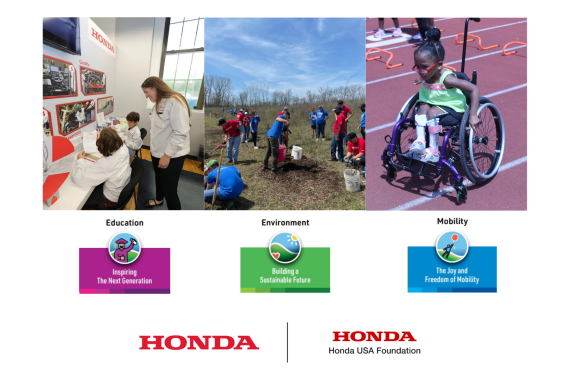Associates Develop Waste Management Solutions
As a company that uses many different materials in its manufacturing and logistical processes, Honda feels that waste management is vital to reducing its environmental impact.
Waste can be created throughout the entire lifecycle process of a product, but Honda believes that through diligent management programs, waste can be decreased or eliminated at many of these steps. From maximizing the use of raw materials, which eliminates waste at its source, to finding new ways to recycle, reuse or use waste for energy recovery, Honda’s management programs have paid dividends in reducing its environmental footprint.
A key part of these programs is involving Honda associates to discover innovative ways to eliminate waste throughout their processes. One example of this earned Honda Precision Parts of Georgia, LLC, associates an award for developing a new method for reusing wastewater by evaporation.
The system evaporates the wastewater, leaving the metal and oil byproducts behind. The water is then pumped through carbon filters, leaving it clean enough for non-potable uses in the plant. This was the first time that the system had been used to treat wastewater, and it earned the plant an award from Industrial Water and Wastes Digest.
“At HPPG, it’s a pretty big deal,” HPPG Facilities Manager Wayne Karcz said. “There aren’t any plants using evaporation for wastewater recycling, it reduces water and energy use and helps us preserve the water source for everyone in the area.”
Associates at the new Performance Manufacturing Center, where Acura’s NSX supercar is built, found a novel way to recycle the more than 1.2 million gallons of water it would use annually during its painting processes. Using capacitive reionization allowed the new plant to reuse 90 percent of its wastewater and reduce fresh water consumption by more than 1,000,000 gallons/year.
Efforts like these, when paired with company initiatives, have resulted in significant gains in waste reduction throughout its North American facilities.
Honda’s parts distribution centers operate with less than 1% of operating waste going to landfill, which is among the highest in the industry. In its manufacturing processes, Honda reduced solid waste per automobile by 4.9% from a year ago despite increased production, and has decreased waste-to-landfill per auto by 96 percent from a baseline year of 2001.
FY2016 Waste Management Actions
Honda and Acura automotive dealers have developed a continually-expanding service parts recycling program that covers a variety of parts and products. In 2016, 882,300 batteries, 4,288 engines, 69,958 wheels, 539.375 catalytic converters and 17,125 nickel-metal hydride batteries were recycled and kept out of the waste stream.
- Through a partnership with its vendors, and improved procedures for managing recycled parts, 39.23 million pounds of recyclable material from electronic waste and overstock service parts were diverted from landfills.
- Total landfill waste from automobile manufacturing operations in North America has been reduced 96% from 2001 levels to less than 2.3 kilograms per auto in FY2016.
- Total waste to landfills for all manufacturing operations in North America, including power equipment products, has been reduced 92% during the same period.

